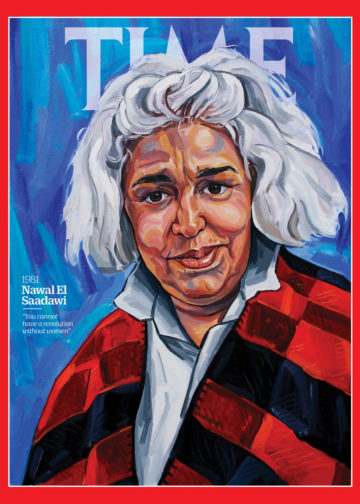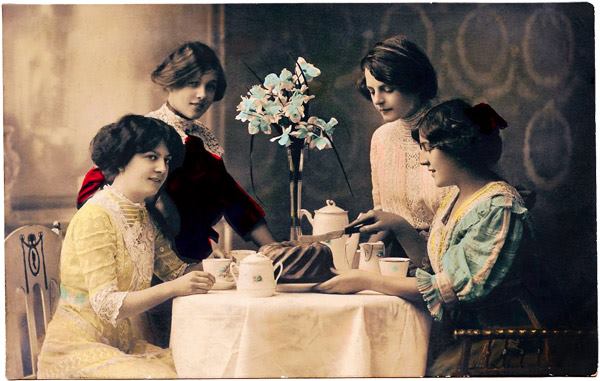This post is also available in: Français (French) العربية (Arabic)
“Nothing conquers death like writing, the Prophet Moses and Judaism would not have survived without the Torah, Jesus Christ and Christianity would not have survived without the Bible, and the Prophet Muhammad and Islam would not have survived without the Quran. Does that explain the reason why women and slaves were prohibited from writing?!”
Nawal El Saadawi – My Life, Part II, Autobiography
On 21 March, 2021, death took from our world an exceptional woman who led an inspirational struggle to be liberated from patriarchy’s shackles for over 65 years. Nawal El Saadawi had also spent more than 50 years leading as a staunch opponent of capitalism, classism and religious fascism.
The photo of the doctor, writer, and fighter graced one of a hundred magazine covers issued by the American Time Magazine in March 2020, as part of its 100 Women of the Year project, in recognition of her multi-faceted struggle against patriarchy’s authoritarianism.
A year later, due to her sudden departure, Nawal El Saadawi’s photo returned to the pages of many major magazines and local and international news websites, accompanied by articles celebrating a journey marked by bold battles and unwavering positions.
Nawal El Saadawi challenged all different forms of patriarchy and was not afraid of any of it, she walked on bumpy and muddy paths with her writings and used her words as weapons in fierce battles she fought, breaking all the shackles. Fear and frustration never got to her. Reading Nawal’s writings was an act of rebellion against the authority of the ‘family,’ and a form of resisting authoritarian society. Women and girls watching her televised discussions and interviews became an act of rebellion against the values of decorum and propriety that were defined by the masculine mentality. Declaring one’s agreement with her views – either partially or completely – opened the door to being shunned and ostracized by society.
But all this terrorization that had been practiced against Nawal and all those who were influenced by her did not prevent her ideas from spreading and overcoming the obstacles that had been put up by conservatives and fundamentalists, not just in Egypt and Arabic-speaking countries, but all over the world. The unquestionable truth is that Nawal’s writings helped many women and girls who had gotten involved in the Arab and Egyptian feminist movement to understand the different manifestations of disguised violence and other values that serve the patriarchal system. Her words motivated them to challenge instead of adapt to and resist instead of coexist with the injustices wrought upon them.

Born from the womb of anger, her writings inspired millions
In a conversation with the Swiss historian and critic, Hans Ulrich Obrist, published by the famous art magazine E-Flux in 2013, Nawal spoke of the journey that led her to writing, confirming to all those who know her that she is indeed an angry women, and before that an angry girl and angry child. Her anger was the product of the absence of justice and double-standards being imposed on women in society. Writing became her instrument for protest, and later, her vehicle to liberation and change. She responded to one of the questions of the interviewer saying: “I love any form of creativity for self-expression, be it dance, music or writing. I never dreamt of becoming a doctor, I never dreamt of that. I even hated doctors, teachers and university professors too, never thinking that I’d one day become a doctor and a university professor. But I wrote all my life. My frustration with what surrounded me was what really encouraged me to write. I was angry at society; as a girl I used to feel that there was something wrong with the world surrounding me, in my family, the school and the streets. I used to feel there was something wrong with how society treated me. Therefore, I can tell you that my writing came from my frustration and anger.”
This anger resulted in a corpus of approximately 50 written works belonging to different literary genres, from novels to plays, to memoirs and articles, translated into almost 40 languages. Perhaps her most prominent works are: Women and Sex, Woman at Point Zero, Women and Neurosis, The Fall of the Imam, Memoirs of a Woman Doctor, and Memoirs in a Women’s Prison.
Because she realized early on that violence was complex… her struggle was multi-faceted
Nawal El Saadawi was one of the first feminists in the Arab world who adopted an intersectional perspective in their definition of feminism and their analysis of the experiences of women and their complicated realities. Since the 1980s, she has continually emphasized that the oppression and persecution of women was not comprised of one thing, but many things like capitalism, classism, racism, education, and religious authority.
In an interview with The Guardian published in 2010, Nawal said: “Feminism includes everything; social, political and sexual justice, and ties medicine with literature, politics, economy, psychology and history.” She then articulated her vision: “Feminism is all of this. You cannot fathom women’s oppression without understanding all of that.”
Women and sex… and the intrusion of taboos
Nawal El Saadawi published her most controversial and seminal book, Women and Sex, in year 1969, which a big segment of feminist activists find comparable in its importance to the Arab feminist movement to Simone de Beauvoir’s The Second Sex to the Western feminist movement.
The book addresses several issues that were not only considered sensitive topics at the time it was published, but even today, like women’s bodies and society’s authority over it, virginity and the obsession with it, the concept of ‘honor,’ the double standards in the upbringing and education of males and females, female genital mutilation, sexual pleasure, and masturbation.
Of course, a book like that did not easily see the light of day. Egyptian authorities during the era of President Gamal Abdel Nasser confiscated the book, which forced Nawal to publish it in the Lebanese capital Beirut two years later. Somehow, copies of the book reached Egypt, causing doctors and religious clerics to respond by describing Nawal as an enemy of society and Islam, and accusing her of encouraging women to become “morally corrupt.” They claimed that female genital mutilation is a mandatory practice that protects a girl’s virginity and suppresses her sexual desires. They did not stop until they punished the woman who got away from the masculine leash and challenged the patriarchal authoritarian mentality that does not accept difference or any rebellion against it – leading to her suspension from the Ministry of Health in 1972.
“While society recognizes the sexual desires of boys, it denies girls of theirs. Therefore, it can be said that a boy reaching puberty is seen as something positive that confirms his [sexual] instinct and desire for the other sex. But a girl reaching puberty means denying and shunning sex.”
– Women and Sex
She was the first to stand against female genital mutilation
After Nawal El Saadawi graduated from Kasry Al-Ainy Faculty of Medicine at Cairo University in 1955, she decided to wage a war on the practice of removing the external genitalia, also known as female genital mutilation, as well as all who support and uphold it. Nawal saw it as one of the most primitive tools for the oppression of women. She relied in her protests on medical facts that prove the ineffectiveness of this procedure and the serious danger it poses to girls’ health. She became the first Egyptian women to publicly and loudly fight and campaign against the crime of disfiguring external genitalia. She continued her campaign until she died despite the repeated threats and prosecutions, accusations of debauchery, and malicious insults.
Nawal did not give up the fight – even after the first legislation criminalizing female genital mutilation was issued in 2008, and tougher penalties were introduced in 2016 – because her goal has always been to change the reality and not merely amend a few words in laws or adding misleading phrases to them.
“Why does the practice of genital mutilation, on males or females, happen? Can it be that God ordered the severing of the same organ it created in women’s bodies? Is it possible that God would fall in this contradiction, to create something and then order its severance? In 1975, I was a young doctor in the village of Tahla in the Gharbia governorate. There, I began to feel the need to oppose those heinous procedures, and that was when I began reading history and religions in order to understand how those practices started.”
– About Women, Religion, and Values
That is why they hate her… she stood up to society with its double standards
Nawal was set on revealing the contradictions of society in dealing with men and women, especially when it comes to the issue of ‘honor’. Since the 1970s, she did not stop writing in protest of defining honor by women’s behavior and specifically their sexual lives. She regularly protested the association of women’s genitalia with unrighteousness, sinfulness, and uncleanliness, in contrast to the association of men’s genitalia with concepts of power, superiority and distinction.
During her long journey, Nawal consistently reminded both her opponents and supporters alike, that for both men and women, honor is about upholding honesty in one’s words and actions. She repeatedly demanded adopting legislation against honor crimes committed against women and girls under the pretext of protecting or defending one’s honor. Her last clear demand for this was in an article she wrote, title “Honor crimes killing women and girls in the name of honor… what barbarism and what shame!” published in Al- Masry Al-Youm on 21 September, 2020.
“There is no doubt that one of the results of the moral double-standards of the patriarchal system in different societies is this inadequate understanding of honor, as it has become associated with protecting sexual genitalia and it is tied to women only. Men’s honor has nothing to do with their behavior, but is related to the behavior of their wives, daughters and mothers. An immoral man is still honorable if his wife is not betraying him with another man, and a hypocritical man is still honorable as long as his daughter keeps her hymen intact before marriage.”
– The Political and Sexual Cause of Egyptian Women
She continued the fight from behind prison bars
In an interview with Al-Arabiya channel, aired in May 2018, Nawal El Saadawi said that one of the most difficult moments in her life was being imprisoned in 1981.
“If the most difficult moment in the life of a person sentenced to death is the one that precedes the falling of the guillotine on their neck, the hardest moment in my life was the one that preceded my entering the prison cell.”
– Memoirs in a Women’s Prison
Nawal El Saadawi was imprisoned on September 6, 1981, as part of a wide campaign of arrests, known as the “September arrests,” which targeted intellectuals and writers who opposed then Egyptian President Anwar Sadat.
Nawal spent three months at the Al-Qanater Al-Khayreya Women’s Prison, during which she did not stop writing despite prison authorities prohibiting the entry of pens, papers and books to the wards of prisoners of conscience and political prisoners. She used to write her memoirs on tissue paper or tobacco rolling paper using a kohl eyeliner. She later published her memoirs after she got out of prison under the title of Memoirs in a Women’s Prison, which became one of the most famous books in prison literature internationally.

When the stories of survivors of sexual violence started pouring in during the first half of last year, each story and testimony substantiated the one before it, destabilizing patriarchal foundations. This led to the formation of networks of support and solidarity amongst women who might have not met before or will meet later, but they gave each other strength and courage when they pushed the walls of violence and broke the boundaries.
Nawal did that throughout her life. As a doctor, she offered material support to dozens of women, and as an inimitable intellectual and writer, she offered inspiration and moral support to millions of people. She created solidarity amongst millions of women when she told the stories of the pain and violence she lived through, leaving a lasting impact on those who read her works and realized that they are not alone.
Nawal formed bridges between her and many women who read her writings, thanks to her texts and the thoughts they conveyed, tens of millions of girls changed tracks and broke the shackles that tied them back. Nawal’s writings also helped them survive their pain and regain control over their lives.
“After I entered prison, I realized that women solidarity is more dangerous than a nuclear weapon, nothing threatened prison authorities more than solidarity between us women. After I got out of prison, I realized that women solidarity is capable of bringing down a ruling regime.”
– Nawal El Saadawi, My Life… Part III































